Cardiovascular Surgery
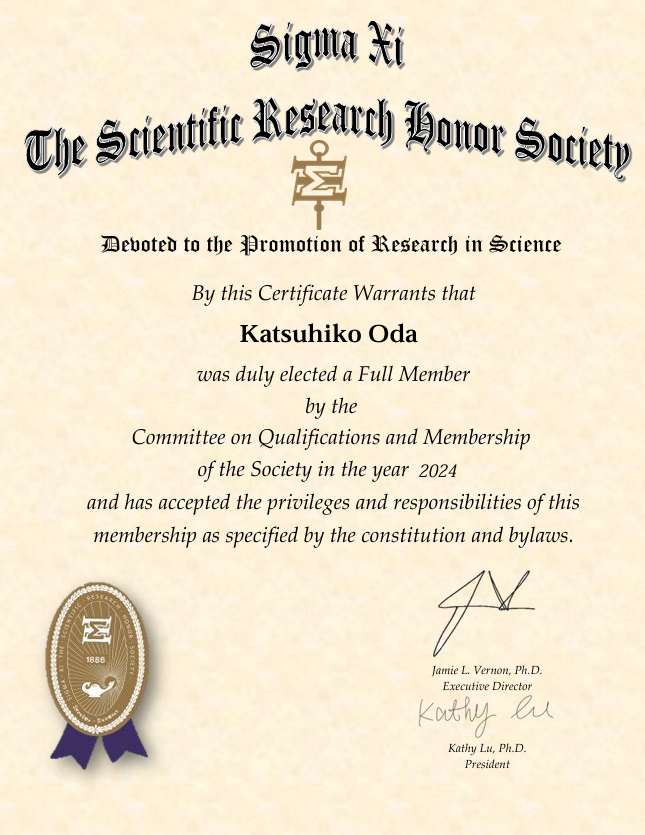 Dr. Katsuhiko Oda, Director of the Cardiovascular Center and Head of the Medical Safety Management Department, has been elected as a Full Member of Sigma Xi, The Scientific Research Honor Society. Established in 1886, Sigma Xi is one of the oldest and most prestigious non-profit honor societies in the United States dedicated to science and technology. The Society recognizes excellence in scientific research and aims to promote and encourage the advancement of science. Sigma Xi boasts more than 200 Nobel Prize laureates among its members, including some of the world’s most influential scientists such as Dr. Albert Einstein, Dr. Satoshi Ōmura, and Dr. Ei-ichi Negishi. Dr. Oda’s exceptional contributions to the field of cardiovascular surgery have been highly recognized, earning him this distinguished membership.
Dr. Katsuhiko Oda, Director of the Cardiovascular Center and Head of the Medical Safety Management Department, has been elected as a Full Member of Sigma Xi, The Scientific Research Honor Society. Established in 1886, Sigma Xi is one of the oldest and most prestigious non-profit honor societies in the United States dedicated to science and technology. The Society recognizes excellence in scientific research and aims to promote and encourage the advancement of science. Sigma Xi boasts more than 200 Nobel Prize laureates among its members, including some of the world’s most influential scientists such as Dr. Albert Einstein, Dr. Satoshi Ōmura, and Dr. Ei-ichi Negishi. Dr. Oda’s exceptional contributions to the field of cardiovascular surgery have been highly recognized, earning him this distinguished membership.
For questions about cardiovascular surgery or general medical
inquiries, please refer to the information here. We answer questions
on 36 different topics.
We created an animation based on our department’s treatment strategy
for type A aortic dissection. Please take a look.
Staff Introduction
Katsuhiko Oda, MD, PhD
Position: Director of Medical Safety Management and Director of the Cardiovascular Center
University (Department) and Graduation Year: Tohoku University (Tohoku University Cardiovascular Surgery), 1991
Affiliations and Qualifications:
• Clinical Professor, Department of Cardiovascular Surgery, Tohoku University School of Medicine
• A full member of Sigma Xi, The Scientific Research Honor Society
• Active surgeon member, The Society of Thoracic Surgeons (STS)
• A member of Premium Professional Plus, The American Heart Association(AHA)
• Board-Certified Cardiovascular Surgeon, Board-Certified Trainer, The Japanese Board of Cardiovascular Surgery
• Board-Certified Surgeon, Board-Certified Instructor, Japan Surgical Society
• Councillor, International Member, The Japanese Society for Cardiovascular Surgery
• Councillor, Lifetime Board-Certified Thoracic Surgeon, Board-Certified Instructor, The Japanese Association for Thoracic Surgery
• Councillor and Certified “Advanced Medical Safety Promoter” of Japan Society of Clinical Safety
• Board-Certified Member, Japanese Circulation Society
• Member, Japanese Society for Vascular Surgery
• Member, Japan Transcatheter Valve Therapies
• Member, Japanese Society for Artificial Organs
• Certified Supervisor for Thoracic and Abdominal Stent Grafts
• Certified Practitioner for Implantable Ventricular Assist Devices
• Certified Supervisor for Endovenous Laser Ablation for Varicose Veins
• SV Committee Member, Japanese Cardiovascular Surgery Database
• Member, Japanese Society of Clinical Ventricular Assist Systems
• Member, Registered Instructor of Cardiac Rehabilitation (RICR), The Japanese Association of Cardiac Rehabilitation
• Board-Certified Clinical Training Instructor
• Board-Certified Medical Safety Manager
• Palliative Care Training Program Graduate
• PTLS Course Graduate
• ACLS Provider (G2020)
• Certified Patient eXperience Expert of Association for Patient eXperience Japan
 https://orcid.org/0000-0003-0953-671X
https://orcid.org/0000-0003-0953-671X
________________________________________
Shintaro Katahira, MD, PhD
Position: Chief of the Cardiovascular surgery
University (Department) and Graduation Year: Yamagata University (Tohoku University Cardiovascular Surgery), 2004
Affiliations and Qualifications:
- Board-Certified Cardiovascular Surgeon, Board-Certified Trainer, The Japanese Board of Cardiovascular Surgery
- Board-Certified Surgeon, Board-Certified Instructor, Japan Surgical Society
- Councillor, International Member, The Japanese Society for Cardiovascular Surgery
- Councillor, The Japanese Society for Vascular Surgery
- Member, The Japanese Association for Thoracic Surgery
- Member, Japanese Circulation Society
- Member, European Association for Cardio Thoracic Surgery
- Member, Japanese Society of Clinical Ventricular Assist Systems
- Certified Supervisor for Abdominal Stent Grafts
• Certified Practitioner for Thoracic Stent Grafts - Certified Practitioner for Implantable Ventricular Assist Devices
- Certified Practitioner for Endovenous Laser Ablation for Varicose Veins
- Certified Transplant physician
- Certified Clinical Training Instructor
________________________________________
Makoto Takahashi, MD, PhD
University (Department) and Graduation Year: Tohoku University (Tohoku University Cardiovascular Surgery), 2012
Affiliations and Qualifications:
• Board-Certified Surgeon, Japan Surgical Society
• Board-Certified Cardiovascular Surgeon, The Japanese Board of Cardiovascular Surgery
• Member, The Japanese Association for Thoracic Surgery
• Member, The Japanese Society for Cardiovascular Surgery
• Member, The Japanese Society for Vascular Surgery
• Member, Japanese Circulation Society
• Certified Supervisor for Abdominal Stent Grafts
• Certified Practitioner for Thoracic Stent Grafts
• Certified Supervisor for Endovenous Laser Ablation for Varicose Veins
• Certified Clinical Training Instructor
________________________________________
Ryuichi Taketomi, MD, PhD
University (Department) and Graduation Year: Tohoku University (Tohoku University Cardiovascular Surgery), 2016
Affiliations and Qualifications:
• Board-Certified Surgeon, Japan Surgical Society
• Member, The Japanese Association for Thoracic Surgery
• Member, The Japanese Society for Cardiovascular Surgery
• Member, The Japanese Society for Vascular Surgery
________________________________________
Takahiko Hasegawa, MD
University (Department) and Graduation Year: Tohoku University, 2020
Affiliations and Qualifications:
• Member, Japan Surgical Society
• Member, The Japanese Association for Thoracic Surgery
• Member, The Japanese Society for Vascular Surgery
________________________________________
Rina Akanuma, MD
University (Department) and Graduation Year: Iwate Medical University, 2020
Affiliations and Qualifications:
• Member, Japan Surgical Society
• Member, The Japanese Association for Thoracic Surgery
• Member, The Japanese Society for Vascular Surgery
Treatment Overview
Number of Surgeries
Our department is responsible for surgical treatment of cardiac and vascular diseases. We perform 300-350 cardiovascular surgeries annually, primarily for school-aged children to adults, including those over 80 years old. We accept patients 24/7, 365 days a year without interruption.
We strive to provide standard cardiovascular surgeries with stable long-term results to the residents of Iwate Prefecture.
Target Diseases
Ischemic Heart Disease
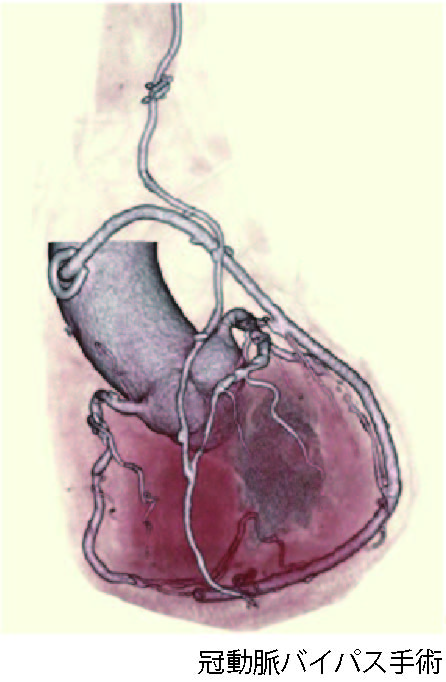
Ischemic heart disease involves diseases of the “coronary arteries” that supply the heart, such as acute myocardial infarction and angina pectoris, often presenting with chest pain. Many cases are treated with catheter-based interventions (PCI: Percutaneous Coronary Intervention) by cardiologists. However, for complex lesions, such as those at the entrance or bifurcation of the left main coronary artery, coronary artery bypass grafting (CABG) by cardiac surgeons has been shown to provide better long-term outcomes. The patency rate of LITA-LAD, the gold standard for CABG, is over 99% in our department over the past five years. Almost all cases are anastomosed on a beating heart. The choice between PCI and CABG is discussed by the “Heart Team,” which includes cardiologists, our department, and various other professionals.
We also perform emergency surgeries to save lives in cases of left ventricular rupture or ventricular septal defect following acute myocardial infarction. For ischemic cardiomyopathy with severely reduced heart function where standard CABG is ineffective, we also offer treatment with ventricular assist devices. Left ventricular reconstruction surgery is also safely performed for left ventricular aneurysms causing heart failure.
Valvular Disease
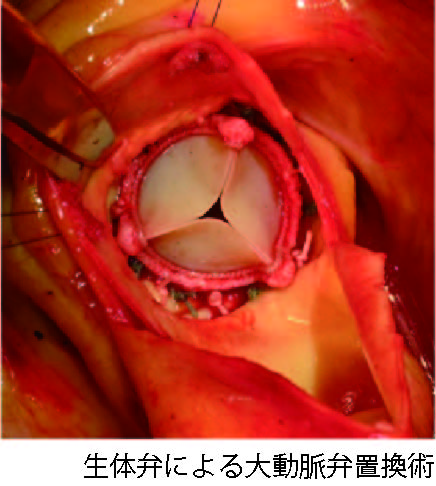 Valvular disease involves the stenosis or regurgitation of heart valves, placing a burden on the heart, and often presenting with shortness of breath. The main valves treated are the mitral, aortic, and tricuspid valves. We aim to perform valve repair whenever possible for mitral and tricuspid valves but also perform valve replacement if repair is difficult. Aortic valve treatment primarily involves valve replacement. Traditionally, these surgeries are performed with cardiopulmonary bypass and cardiac arrest. We use real-time three-dimensional echocardiography for accurate evaluation during valvular disease treatment.
Valvular disease involves the stenosis or regurgitation of heart valves, placing a burden on the heart, and often presenting with shortness of breath. The main valves treated are the mitral, aortic, and tricuspid valves. We aim to perform valve repair whenever possible for mitral and tricuspid valves but also perform valve replacement if repair is difficult. Aortic valve treatment primarily involves valve replacement. Traditionally, these surgeries are performed with cardiopulmonary bypass and cardiac arrest. We use real-time three-dimensional echocardiography for accurate evaluation during valvular disease treatment.
From April 2021, we have been operating a hybrid operating room and started catheter-based valvular treatments, such as TAVI for aortic valves and Mitraclip for mitral valves, actively involving our department. We plan to introduce various treatment methods in collaboration with the cardiology department. The “Heart Team,” comprising multiple professionals, ensures the best treatment options.
We also actively treat acute heart failure caused by infective endocarditis, which rapidly destroys valves, and patients with papillary muscle rupture following myocardial infarction to save lives.
Severe Heart Failure
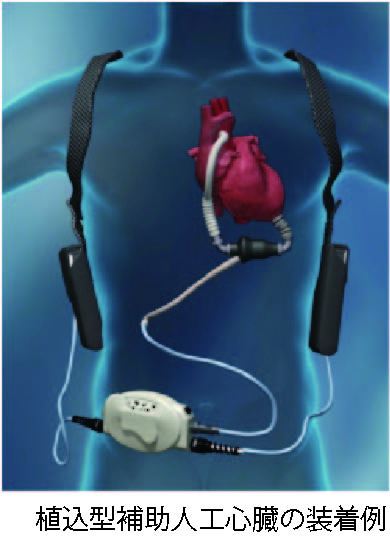 Various conditions cause severe heart failure, such as dilated cardiomyopathy, hypertrophic cardiomyopathy, and fulminant myocarditis. When conventional medical or surgical treatments are ineffective, and the patient is in a critical state, treatment with ventricular assist devices may be necessary. The development of assist devices is progressing rapidly.
Various conditions cause severe heart failure, such as dilated cardiomyopathy, hypertrophic cardiomyopathy, and fulminant myocarditis. When conventional medical or surgical treatments are ineffective, and the patient is in a critical state, treatment with ventricular assist devices may be necessary. The development of assist devices is progressing rapidly.
Multidisciplinary collaboration is crucial for this treatment. To facilitate treatment in this field, we have established a Ventricular Assist Device Center, specialized outpatient clinics, and are the only certified facility in the prefecture for implantable ventricular assist devices. Since April 2020, the intracardiac pump catheter “Impella” has been available. Our department has two certified practitioners for implantable ventricular assist devices, two certified artificial heart management technicians, and five certified extracorporeal circulation technicians.
We also work closely with Tohoku University Hospital, the only heart transplant facility in the Tohoku region. We accept severe cases from other prefectural hospitals and Iwate Medical University.
Congenital Heart Disease
We mainly treat simple congenital heart diseases in school-aged children and older. Due to the prevalence of screenings and improved diagnostic capabilities, most congenital heart diseases are treated with catheter-based interventions in childhood, and adult cases have decreased in recent years. Complex congenital heart diseases requiring treatment in infancy are treated at specialized children’s hospitals nationwide, not in our department. Treatment is provided at facilities such as Iwate Medical University and Miyagi Prefectural Children’s Hospital.
Cardiac Tumors and Pericardial Diseases
We treat cardiac tumors, typically benign myxomas, using cardiopulmonary bypass to remove the tumor. Malignant cardiac tumors are rare but may be treated depending on the type. We also perform combined surgeries with the thoracic surgery department for tumors that have spread to the lungs.
Constrictive pericarditis is a condition where the pericardium becomes thick and rigid, restricting the heart’s ability to expand and receive blood. We perform surgery to carefully peel away the pericardium and relieve the pressure on the heart.
Acute Aortic Dissection
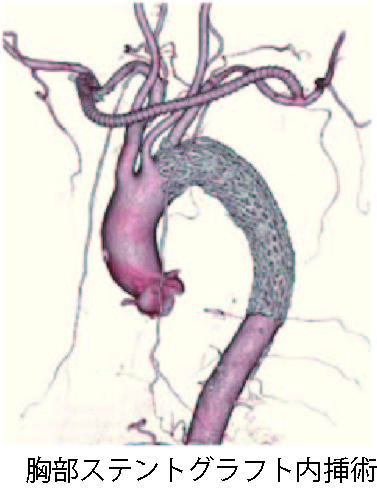
Acute aortic dissection is a life-threatening condition presenting suddenly with severe back pain. It is classified into Type A, involving the part near the heart, and Type B, sparing the heart. We perform emergency surgeries with selective cerebral perfusion and cardiopulmonary bypass as quickly as possible to save lives in Type A cases. We also actively accept Type B cases from the onset. Both types have good outcomes, with high survival rates.
Recently, thoracic endovascular aortic repair has shown good outcomes for this condition, and we actively adopt this technique. From the onset, we manage patients, placing stent grafts timely to address abdominal or limb ischemia, rupture, or rapid expansion of the false lumen.
Recognizing the importance of the aortic hiatus, we place appropriately timed and positioned stent grafts for excellent early and long-term results. Our hospital is certified for thoracic edovascular aortic repairstent. Two certified supervisors proficient in multiple stent graft systems are on staff.
Thoracic Aortic Aneurysm
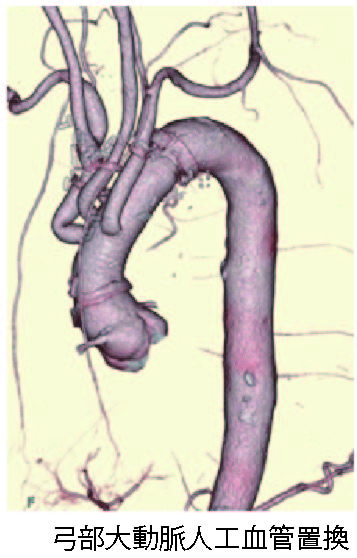
Thoracic aortic aneurysms are typically asymptomatic until rupture and often discovered incidentally during screenings or for other conditions. Traditional treatment involved large thoracic incisions and cardiopulmonary bypass for artificial graft replacement. Our department safely performs selective cerebral and abdominal branch perfusion with excellent outcomes. The application of stent grafts has expanded in this field, with 60% of patients now treated with this method, requiring minimal incisions.
Our department manages both artificial graft replacement and stent graft treatments, allowing detailed explanations of both options’ advantages and disadvantages, ensuring informed patient decisions. We prefer stent graft treatment for elderly patients, provided anatomical conditions are suitable.
Our hospital is certified for thoracic endovascular aortic repair, with two certified supervisors on staff.
Abdominal Aortic Aneurysm
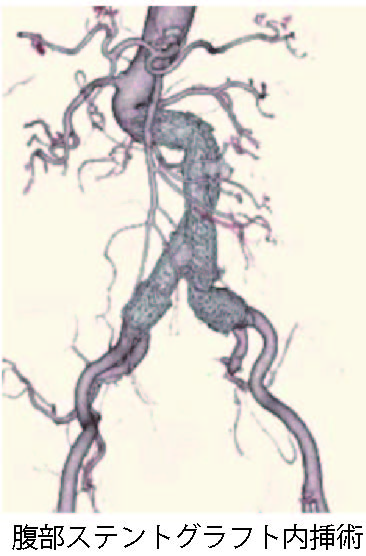
Abdominal aortic aneurysms are also largely asymptomatic until rupture. Early detection and treatment are crucial, as treatment post-rupture has low survival rates. Most are found incidentally during screenings or treatment for other conditions.
Traditionally, treatment involved large abdominal incisions for artificial graft replacement, without cardiopulmonary bypass. Stent graft treatment is now performed in over 70% of cases, involving minimal incisions for faster recovery, especially in the elderly. Using Perclose® reduces the incision size to a few millimeters, minimizing patient burden.
Our hospital is certified for endovascular aortic repair, with three certified supervisors on staff.
Peripheral Arterial Disease
Chronic occlusion or stenosis of peripheral arteries traditionally required bypass surgery with artificial grafts. However, catheter treatments have advanced, reducing bypass surgery frequency. Acute arterial occlusion causing sudden limb pain and discoloration requires emergency balloon thrombectomy, performed by our department.
Varicose Veins
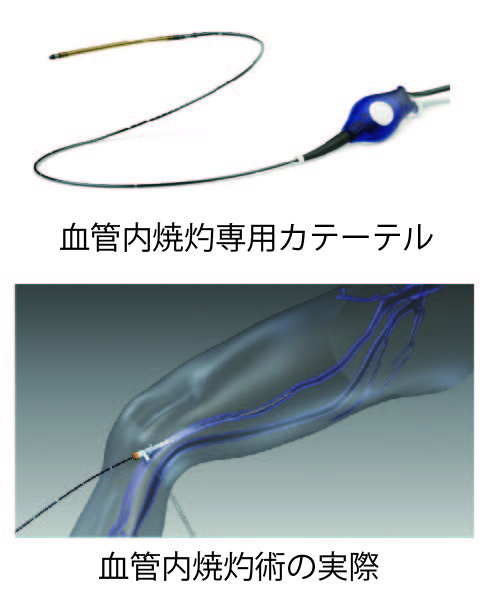
Varicose veins are common in individuals with standing jobs, causing bulging veins, pain, and skin pigmentation. Our department uses endovenous ablation with radiofrequency to minimize patient burden. Vein removal (stab avulsion) is performed through small 2-3mm incisions, minimizing visible scarring.
Our hospital is certified for endovenous ablation for varicose veins, with three certified supervisors on staff.
Preoperative Meeting
Every Thursday evening, a multidisciplinary preoperative meeting for cardiovascular surgery is held, involving cardiac surgeons, outpatient, operating room, ICU, HCU, clinical engineering, and rehabilitation departments. Information is also shared with anesthesiologists and wards. Detailed discussions cover the patient’s surgical condition, surgical procedures, medical history, family history, and medication.
Our preoperative hospital stay is 1-2 days, so preoperative tests are mainly conducted while awaiting surgery. Each patient is discussed twice over two weeks to ensure no missing tests or information.
NCD Registration and Data Analysis
Our hospital collaborates with the National Clinical Database (NCD) for nationwide surgical registration. The cardiovascular surgery section is organized by the Japanese Cardiovascular Surgery Database (JCVSD), and all relevant data from our surgeries are registered, excluding personal information.
This database includes data from all cardiovascular surgery facilities nationwide, allowing us to objectively compare our patient severity and outcomes against national standards, identifying strengths and areas for improvement. We continuously analyze our performance based on this data to provide better treatment.